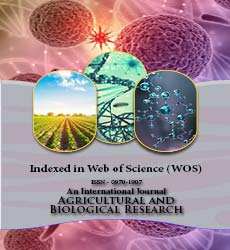Agricultural and Biological Research
RNI # 24/103/2012-R1
Arun Kumar Verma* and Mahendra Kumar Yadav
The overview on the effects of Integrated Nutrient Management (INM) on vegetable crops highlights its multifaceted benefits. INM integrates organic and chemical fertilizers, enhancing soil fertility and structure while optimizing nutrient supply to vegetable crops. INM practices are important in vegetable crop production, enhancing the quantity and quality of crops like tomato, brinjal, chilli, radish, carrots, cabbage, cauliflower, broccoli, okra, cucumber pumpkin, melons, gourd and leafy vegetables. By combining natural and inorganic fertilizers with bio-fertilizers, INM methods reduce input costs and enhance crop quality and nutrition. This sustainable approach optimizes nutrient use efficiency, enhances soil health, reduces environmental pollution and contributes to overall sustainability. It is essential for researchers, policymakers and farmers to promote and encourage INM practices for a more productive and environmentally friendly vegetable farming sector. This balanced nutrition leads to increased vegetables yields, improved crop quality and enhanced nutrient use efficiency. Additionally, INM practices promote sustainable soil management, reducing environmental impact and encouraging resilience to abiotic stresses. By minimizing reliance on synthetic inputs, INM contributes to economic viability for growers while preserving natural resources.
